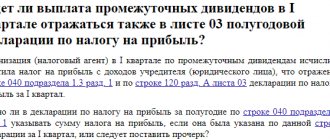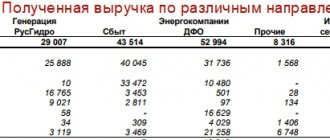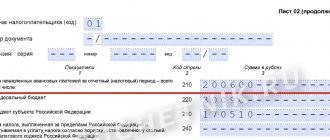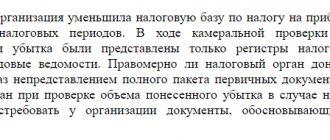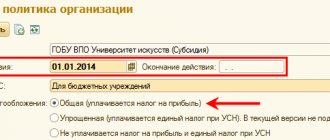Do penalty liabilities reduce profits?
Provisions of paragraph 2 of Art. 270 of the Tax Code of the Russian Federation does not allow penalties and fines levied by budgetary organizations to be accepted as expenses that affect the final result of income tax. This applies to all government sources of fines - both budgetary organizations and non-budgetary ones.
Example
Istok LLC violated the procedure for complying with licensing conditions in accordance with the technical design when using subsoil. An administrative fine of 450,000 rubles was imposed on the company. (clause 2 of article 7.3 of the Code of Administrative Offenses of the Russian Federation). Does Istok LLC have the right to reduce income tax using this amount?
Since the fine accrued to a legal entity must be transferred to the budget of the Russian Federation, its amount is not considered when calculating the tax.
Changes regarding the application of an increasing factor to the basic depreciation rate
When calculating depreciation for buildings with high energy efficiency, increasing factor 2 is not applied (clause 4, clause 1, article 259.3 of the Tax Code of the Russian Federation as amended by Federal Law No. 286-FZ of September 30, 2017).
Taxpayers have the right to apply a special coefficient to the basic depreciation rate, but not higher than 3 in relation to depreciable fixed assets used in the field of water supply and sanitation, according to the list established by the Government of the Russian Federation (clause 4 of clause 2 of article 259.3 of the Tax Code of the Russian Federation as amended by the Federal Law dated 09/30/2017 No. 286-FZ).
Is it possible to reduce the tax base for contributions to non-state pension provision?
Transferred contributions in favor of employees to the Pension Fund and when concluding relevant voluntary insurance agreements for non-state provision of pensions reduce the tax base.
However, the amount of these funds should not be more than 12% of wages. Amounts paid in excess of this established standard (clause 16 of Article 255 of the Tax Code of the Russian Federation) do not affect income tax.
When transferring contributions for your employees to their registered corporate accounts, these expenses also do not reduce profits. This provision is regulated by clause 7 of Art. 270 Tax Code of the Russian Federation.
Example
The Vostok organization transferred contributions to voluntary pension insurance for its employees under existing contractual obligations in June 2021 in the amount of 68,000 rubles. Total labor costs amounted to RUB 256,511. The policyholder can take into account only 6% of this amount for the costs of transferred voluntary insurance premiums, i.e. 15,390.66 rubles. The remaining amount of contributions, equal to RUB 52,609.34, is not taken into account as part of expenses that reduce the tax base.
ConsultantPlus experts explained how to correctly take insurance into account for the purpose of calculating income tax:
If you don't have access to the system, get a free trial online.
Accounting procedure
If the organization uses the accrual method, include other expenses in the calculation of the tax base in the manner prescribed by paragraph 7 of Article 272 of the Tax Code of the Russian Federation. If the organization uses the cash method, write off other expenses in the manner prescribed by paragraph 3 of Article 273 of the Tax Code of the Russian Federation. For more information, see:
- How to account for income and expenses using the accrual method for income tax purposes;
- How to account for income and expenses using the cash method for income tax purposes.
Are the costs of employee travel to their place of work taken into account as income tax expenses?
Under normal conditions, amounts paid by employees for travel on public transport to the place of performance of their work duties are not considered expenses for determining the taxable base (Clause 26, Article 270 of the Tax Code of the Russian Federation). The exception is cases in which the terms of delivery of employees are stipulated in labor or collective agreements (in this case, travel costs are taken into account as wages), or when workplaces are not accessible by transport.
Read more here.
If the employer organizes special flights for the delivery of employees for this purpose, then travel costs do not affect the reduction of income tax. This is evidenced by the letter of the Ministry of Finance dated January 21, 2013 No. 03-03-06/1/18.
The list of non-taxable income has been changed
Before the amendments were made, companies could accept from their participants (regardless of the share in the authorized capital) property and money to replenish net assets (clause 3.4, clause 1, Article 251 of the Tax Code of the Russian Federation).
From January 1, 2021, the founders’ contribution to replenish net assets is excluded from the list of non-taxable transactions. This change is associated with the alignment of the Tax Code of the Russian Federation with the norms of civil legislation (Article 66.1 of the Civil Code of the Russian Federation). Now property and funds contributed by company participants as a contribution to property (without increasing the authorized capital) can be exempt from income tax.
From January 1, 2021, income tax is not paid on income in the form of unclaimed dividends and property, property and non-property rights received as a contribution to the organization’s property (clause 3.7, clause 1, article 251 of the Tax Code of the Russian Federation).
At the same time, the company’s charter must approve the rules according to which participants will contribute property and funds (clause 1, article 27 of the Federal Law dated 02/08/1998 No. 14-FZ, clause 1 of article 32.2 of the Federal Law dated 26.12. 1995 No. 208-FZ).
From January 1, 2021, surpluses in the form of property rights to the results of intellectual activity identified during the inventory of property and property rights carried out by the taxpayer are not subject to taxation (clause 3.6, clause 1, article 251 of the Tax Code of the Russian Federation).
Such changes were introduced by Federal Laws No. 286-FZ dated September 30, 2017, and No. 166-FZ dated July 18, 2017.
How does gratuitously transferred property affect the formation of income tax?
To recognize the validity of certain expenses, they must meet the criteria established by Art. 252 of the Tax Code of the Russian Federation. All expenses incurred must have documentary evidence and also be economically justified, i.e. their goal is to obtain certain benefits.
The gratuitous transfer of property, i.e. the transfer of ownership without subsequent remuneration, excludes the receipt of economic benefits. Therefore, paragraph 16 of Art. 270 of the Tax Code of the Russian Federation prohibits taking into account in expenses the cost of gratuitously transferred property (work, services, property rights), as well as expenses associated with such transfer.
If the transferred property is depreciable, then certain nuances should be taken into account. Until the beginning of 2021, the provisions of paragraph 3 of Art. 256 of the Tax Code of the Russian Federation stated that depreciation is not charged on fixed assets that are transferred with the conclusion of an agreement on free use. It was possible to resume its accrual after the expiration of the contract and the return of the objects to the organization.
But from 01/01/2020, clause 16.7 of Art. 270 of the Tax Code of the Russian Federation prohibits the calculation of depreciation on objects returned after the expiration of the agreement on gratuitous use. This is due to the fact that mention of fixed assets transferred under contracts for free use is also excluded from clause 7 of Art. 259.1 of the Tax Code of the Russian Federation, which established the procedure for resuming depreciation upon termination of a contract of gratuitous use and the return of depreciable property to the taxpayer.
Such rules do not apply to property transferred for free use to government bodies and government agencies, if this obligation of the taxpayer is confirmed by law.
Investment deduction for the acquisition and modernization of fixed assets
From January 1, 2021, the company has the right to reduce the amount of tax (advance payment) for the investment tax deduction in the manner prescribed by Article 286.1 of the Tax Code of the Russian Federation (introduced by Federal Law No. 335-FZ of November 27, 2017).
Important!
The investment tax deduction is applied to fixed assets belonging to 3 - 7 depreciation groups (clause 4 of Article 286.1 of the Tax Code of the Russian Federation).
The essence of the deduction is the opportunity to reduce income for expenses associated with the purchase or modernization of fixed assets of 3 - 7 depreciation groups.
Do voluntary insurance premiums reduce profits?
Expenses incurred under VHI agreements can reduce taxable profit. The classification of these expenses is given in Art. 255, 263 and 291 of the Tax Code of the Russian Federation. Other voluntary insurance costs do not affect the calculation. This is stated in paragraph 6 of Art. 270 Tax Code of the Russian Federation. Such expenses include voluntary liability insurance, which is not a condition of international standards for the activities of the entity. Thus, the insurance premiums that an organization is forced to pay in connection with a violation of a civil liability contract do not reduce profits. Such costs are also not included in the closed list of expenses in accordance with Art. 255, 263, 291 Tax Code of the Russian Federation.
The following voluntary insurance expenses can be taken into account when reducing taxable profit:
- contributions to the Pension Fund under voluntary insurance contracts for their employees;
- insurance of transport, cargo, goods and materials, and other property used in the course of business activities;
- insurance of certain types of risks and liability of organizations;
- life and health insurance of bank borrowers.
Does Article 270 of the Tax Code of the Russian Federation allow taxes charged to buyers to be classified as expenses?
Clause 19 Art. 270 of the Tax Code of the Russian Federation does not recognize taxes presented to its counterparties as expenses. This also applies to trade taxes and excise taxes. The latter is indicated by the letter of the Ministry of Finance of the Russian Federation dated 08/06/2012 No. 03-07-06/209, which states that excise tax amounts presented to buyers or owners of customer-supplied raw materials cannot be taken into account as expenses when taxing profits.
If taxes were presented to the payer in the territory of other states, then these amounts are also not considered as expenses when determining the income tax base. This norm is confirmed by the letter of the Federal Tax Service of Russia for the city of Moscow dated July 31, 2012 No. 16-15/ [email protected]
From here it should be concluded that the amounts of those taxes (VAT, excise taxes, trade taxes) that were presented to the business entity as a buyer are not taken into account for the subsequent calculation of taxable profit.
The situation with VAT is different in the case of providing goods as a gift or bonus to the buyer as an incentive. Tax authorities believe that the amounts of indirect taxes in this case are included in the cost of the property transferred free of charge, and therefore are not considered expenses (clause 16 of Article 270 of the Tax Code of the Russian Federation).
However, judicial practice does not recognize bonuses and other incentives as gratuitously transferred goods and materials, because this requires the purchase of a certain amount of goods.
Provisions of paragraph 19 of Art. 270 of the Tax Code of the Russian Federation also does not include the amount of VAT on bonuses in the list of expenses that do not affect the tax base, since the sale of property in this case does not occur.
The seller himself must decide whether to take into account VAT amounts on bonuses and gifts as expenses when calculating income tax. But at the same time, you need to be prepared for questions from the tax authorities.
See also “Tax paid for a third party: can it be taken into account as expenses?”
Non-targeted expenses: ordered to be reimbursed
Olga Levina and Maria Milliard, experts from the GARANT Legal Consulting Service, spoke about the reimbursement by budgetary institutions of funds for which misuse was identified.
In a budgetary institution, an authorized body of a constituent entity of the Russian Federation carried out an external audit. Misuse of funds within the framework of the implementation of a state task was identified, and an order was issued on the basis of which it was necessary to compensate for the damage caused. Is the damage compensated in full and at what expense if the institution does not conduct extra-budgetary activities, and if the institution conducts extra-budgetary activities?
By virtue of the provisions of Art. 6 of the Budget Code of the Russian Federation, budgetary institutions are not considered recipients of budgetary funds. At the same time, financial department specialists point out that in relation to such institutions, misuse of funds occurs when they are used for purposes not provided for by the plan of financial and economic activities (letter of the Ministry of Finance of Russia dated November 8, 2012 N 02-11-08/4694).
The procedure for the formation and approval of the financial and economic activity plan (hereinafter also referred to as the FCD Plan) is determined by the executive authority (local government body) performing the functions of the founder of the institution (hereinafter referred to as the founder), in accordance with the requirements for the financial and economic activity plan of the state (municipal) institutions approved by order of the Ministry of Finance of Russia dated July 28, 2010 N 81n (hereinafter referred to as the Requirements).
Budgetary institutions independently determine the direction of spending subsidies for the implementation of state (municipal) tasks in accordance with the FCD Plans. In other words, subsidy funds for the implementation of a state (municipal) task do not necessarily have to be spent in strict accordance with those areas (types of expenses) and expenditure standards that were taken into account when calculating the total annual amount of such a subsidy (see, in particular, clause 12 of the Requirements , Section 6 of the Recommendations of the Ministry of Finance of Russia dated October 22, 2013, letter of the Ministry of Finance of Russia dated January 29, 2013 N 02-13-06/293). The main thing is that the state (municipal) task is carried out on time, in full and with proper quality.
In addition, specialists from the financial department indicate that unplanned expenses are possible by saving subsidy funds based on the results of a certain period of completing the task with the introduction of appropriate changes to the FCD Plan (see, for example, letters of the Ministry of Finance of Russia dated December 31, 2014 N 02-01-11/ 69294, dated 12/30/2014 N 02-07-10/69030, dated 08/07/2012 N 02-03-06/3073, dated 08/09/2012 N 02-13-06/3106).
Thus, expenses not provided for by the FCD Plan can be carried out by a budgetary (autonomous) institution using subsidies for completing the task while clarifying the FCD Plan - reducing the volume of any previously planned but not implemented expenses. In this case, adjustments to the standard costs used in calculating the volume of the subsidy are not required.
Directing subsidy funds to fulfill a state (municipal) task for expenses that are not explicitly taken into account when determining its size is unacceptable if such actions will lead to a significant decrease in the qualitative and (or) quantitative indicators of the task at the end of the year.
In addition, from the corresponding budget a budgetary institution may be allocated: - subsidies for other purposes (second paragraph of paragraph 1 of Article 78.1 of the Budget Code of the Russian Federation); — subsidies for capital investments (Article 78.2 of the Budget Code of the Russian Federation).
Specific conditions for the provision of targeted subsidies, as a rule, are established in the relevant contracts (agreements) concluded between the founders and recipients of subsidies. Such documents, in particular, may contain information about: - the purpose, procedure, amount and timing of the provision of subsidies for other purposes; — the procedure and terms for the return of unused or misused amounts; — the procedure and timing for submitting relevant reports and conducting verification activities by the founder.
In the event of the formation of a balance of targeted subsidy funds, the specified balance is subject to transfer to the appropriate budget, if, according to the decision of the bodies exercising the functions and powers of the founders in relation to specific institutions, a decision has not been made in the prescribed manner on the use of the balance in the next financial year if there is a need to direct them to the same goals (Clause 18, Article 30 of Federal Law No. 83-FZ dated 05/08/2010 (hereinafter referred to as Law No. 83-FZ), Section 7 of the Recommendation of the Ministry of Finance of the Russian Federation dated 10/22/2013).
Concluded agreements on the provision of subsidies for other purposes or for capital investments do not deprive the institution of the right to make expenses using subsidy funds to fulfill the state task by redistributing planned assignments, including the purchase of equipment. At the same time, changes must be made to the FCD Plan in a timely manner.
After the end of the financial year, part 17 of Art. 30 of Law No. 83-FZ provides for the possibility of directing the remainder of the subsidy that was not used in the reporting year to a state task, to achieve the goals for which the budgetary institution was created.
The possibility of making an independent decision on the allocation of funds for the implementation of certain expenses in the event of achieving savings in funds resulting from the implementation of a state task, provided that this redistribution of funds does not affect the achievement of indicators of the volume and quality of public services, is contained in the explanations given in letters of the Ministry of Finance of Russia dated October 8, 2012 N 02-13-06/4132 and dated July 12, 2012 N 02-13-06/2703. In addition, such a point of view is taken into account, including by the judiciary, when considering disputes with budgetary institutions about the intended use of budgetary funds (see, for example, the decision of the Thirteenth Arbitration Court of Appeal dated 02/09/2015 N 13AP-306/15).
The Budget Code does not provide for reimbursement by budgetary institutions of funds for which misuse has been identified. Therefore, the question of at the expense of which funds of a budgetary institution such compensation can be made in the presence of an order from the authorized body of a constituent entity of the Russian Federation is not regulated.
According to the amendments made by Federal Law N 252-FZ to the Code of the Russian Federation on Administrative Offenses, misuse of budget funds, expressed in the direction of funds received from the budget of the budget system of the Russian Federation, for purposes that do not correspond to the goals defined by the contract (agreement) or other a document that is the legal basis for the provision of these funds, if such an action does not contain a criminal offense, entails the imposition of an administrative fine on officials in the amount of twenty thousand to fifty thousand rubles or disqualification for a period of one to three years; for legal entities - from 5% to 25% of the amount of funds received from the budget of the budgetary system of the Russian Federation, used not for their intended purpose (Article 15.14 of the Administrative Code of the Russian Federation).
The GARANT system will help you get acquainted with the texts of the documents mentioned in the experts’ response without spending a lot of time on independent analysis .
As an advertisement
Is it possible to reduce profits due to expenses for material incentives for employees?
The costs of paying employees include all payments that are stipulated in the employment or collective agreement. Other bonuses and compensation payments, the possibility of accrual of which is not provided for by an employment or collective agreement, do not reduce taxable profit (clause 21, clause 23 of Article 270 of the Tax Code of the Russian Federation). A similar position is shared by the Ministry of Finance of the Russian Federation in letter dated February 26, 2010 No. 03-03-06/1/92 and the Federal Tax Service of the Russian Federation for the city of Moscow in letter dated August 13, 2012 No. 16-15/074028/@.
The same amounts that are paid to employees by organizations in addition to their work activities are taken into account as expenses if their accrual is provided for in the employment contract (letter of the Federal Tax Service dated April 1, 2011 No. KE-4-3/5165).
Amounts paid to employees as financial aid are not included in expenses that form profit (clause 23 of Article 270 of the Tax Code of the Russian Federation). This rule does not affect the amounts of payments that are not recognized as financial assistance, which is confirmed by the provisions of employment contracts. This position is supported by the Ministry of Finance of the Russian Federation in letter dated 06/03/2014 No. 03-03-06/4/26582.
It is customary for some companies to pay raises to their employees. Is it possible to count on certain tax benefits in such cases?
Organizations have the right to compensate some of the expenses of their employees when they move in connection with a new place of work. In relation to civil servants (employees of government agencies, extra-budgetary funds and other federal institutions), the standards for such payments are determined by law.
In private organizations, accountants often wonder how to protect themselves in this case from attention from inspection bodies? For employees of commercial organizations, the total amount of possible compensation payments should be specified in local regulations. These are labor and collective agreements, as well as provisions on remuneration. Amounts spent on payments in excess of the established lifting standards are not included in expenses reducing income tax (clause 37 of Article 270 of the Tax Code of the Russian Federation).
The following question often arises: how do the organization’s expenses for the needs of employees determine the profit of the enterprise?
Expenses of legal entities aimed at organizing leisure time for their employees do not reduce the tax base (Clause 29, Article 270 of the Tax Code of the Russian Federation). This includes payment for employee vouchers for recreation or treatment, events for organizing cultural leisure (excursions, sports clubs, competitions), costs for subscriptions to non-production literature and for personal consumption goods for the needs of employees. The organization carries out all these expenses at its own discretion.
Attention! From 01.01.2019, under certain conditions, it is possible to expense the payment of travel vouchers to employees.
And if there was a fact of gratuitous transfer of property to employees, is it possible to take these transactions into account when calculating income tax?
Example
The organization provided free financial assistance to its employee who was injured in a fire in his own home. Is it possible to reduce the tax base by this amount?
Freely transferred property refers to material assets, the transfer of which for the benefit of recipients is not the responsibility of the organization. The same applies to associated costs.
Regulations of paragraph 16 of Art. 270 of the Tax Code of the Russian Federation excludes the cost of such property from the list of necessary expenses. That is, if the employer voluntarily provides assistance to both its employees and other persons affected by force majeure (natural disasters), the value of the freely provided assets and the expenses incurred in connection with this do not affect the decrease in profit.
Thus, the desire to improve the financial situation of employees, not related to official relations, will not always be a reason for reducing the final amount of profit.
Are amounts paid to a notary taken into account when determining income tax?
The state has established fixed tariffs for fees that are charged for performing certain notarial acts. Expenses include expenses incurred when using the services of public and private notaries.
Clause 39 art. 270 of the Tax Code of the Russian Federation, the list of costs that do not participate in the formation of taxable profit also includes excess costs for notary services. This usually applies to actions that do not require an established notarial form. The calculation of tariffs in this case is based on the requirements of Art. 22 Fundamentals of the legislation of the Russian Federation “On notaries”.
The procedure for calculating R&D expenses has been adjusted
From January 1, 2021, companies will be able to include more R&D expenses.
In addition to the costs spent on development, actual expenses for scientific development also include insurance premiums (clause 2, paragraph 2, article 262 of the Tax Code of the Russian Federation as amended by Federal Law No. 166-FZ of July 18, 2017). However, companies will continue to use a 1.5 ratio to actual R&D expenses.
The actual costs can take into account the purchase of exclusive rights to inventions, utility models, samples (clause 3.1, clause 2, Article 262 of the Tax Code of the Russian Federation).
Companies that incur R&D expenses in the amount of actual costs using a coefficient of 1.5 submit a report on the R&D performed (individual stages of work) to the tax office.
The report is submitted to the tax authority simultaneously with the tax return based on the results of the tax period in which scientific research and (or) development work (individual stages of work) were completed. The report is presented in relation to each scientific research and development project (individual stage of work) and must comply with the general requirements for the structure and rules for the preparation of scientific and technical reports established by the national standard (clause 8 of Article 262 of the Tax Code of the Russian Federation).
Is it possible to include payments for environmental pollution in the costs of forming the tax base?
Amounts of taxes and fees are included in expenses that reduce the income tax base (subclause 1, clause 1, article 264 of the Tax Code of the Russian Federation). This may also include payment for negative impact on the environment. However, when excess emissions are committed, payments in amounts exceeding the established limit are not classified as expenses that reduce the taxable base (clause 4 of Article 270 of the Tax Code of the Russian Federation).
Example
The production organization Saturn LLC makes payments for negative impacts on the environment. Over the past year, she transferred 108,930 rubles for these purposes, including 90,775 rubles. for emissions in excess of established standards. When determining the taxable base, Saturn LLC takes into account only the amount of the fee, equal to 108,930 – 90,775 = 18,155 rubles. for emissions into the environment within established limits.
Read about the procedure for calculating payments for negative environmental impact in this article.
New benefits for tourism business in the Far East
Companies engaged in tourism business in the Far East can apply a 0 rate for tax periods from January 1, 2021 to December 31, 2022 (clause 1.11, introduced by Article 284.6 of the Tax Code of the Russian Federation as amended by Federal Law No. dated July 18, 2017 168-FZ).
In this case, the following conditions must be met:
- the location of the company is the territory of the Far Eastern Federal District;
- the company carries out activities included in the list of types of tourist and recreational activities approved by the Government of the Russian Federation;
- during the entire tax period, the company owns a hotel and (or) other accommodation facility, which are registered with the state cadastral register in the Far Eastern Federal District;
- the company does not apply reduced income tax rates throughout the entire tax period (clause 1 - 1.10 of Article 284 of the Tax Code of the Russian Federation);
- the company does not carry out transactions with securities or derivative financial instruments during the tax period;
- the company does not have separate divisions that are not part of the Far Eastern Federal District;
- for the tax period, the company’s income from carrying out tourist and recreational activities included in the list amounts to at least 90 percent of its income taken into account when determining the tax base (excluding income in the form of positive exchange rate differences provided for in paragraph 11 of Article 250 of the Tax Code of the Russian Federation).
Important!
If the company violates at least one of the conditions or does not provide information within the established time frame (clause 4 of Article 284.6 of the Tax Code of the Russian Federation), then the generally established tax rate is applied. In this case, the amount of income tax is subject to restoration and payment to the budget with payment of penalties (clause 5 of Article 284.6 of the Tax Code of the Russian Federation).
Does prepayment increase expenses in terms of income tax calculations?
If business entities use the accrual method, then their expenses as an advance payment for work or services do not affect the total amount of expenses when determining the taxable base (clause 14 of Article 270 of the Tax Code of the Russian Federation).
Letter of the Ministry of Finance dated June 30, 2011 No. 07-02-06/115 determines the taxpayer’s right to create reserves for doubtful debts. When creating reserves, the listed advance payments are not recognized as expenses even in the absence of delivery of the paid goods.
Can the costs of purchasing equipment be classified as expenses?
Equipment purchased by an organization should be classified as a receipt of fixed assets if this property meets the following requirements:
- intended for long-term use (more than 12 months);
- operation of the equipment is aimed at generating profit for the enterprise;
- subsequent resale of the object is not expected;
- the cost of the acquired property is not less than RUB 100,000.
Fixed assets are classified as depreciable assets. Acquisition costs are written off over the entire period of use, gradually reducing the taxable profit base.
Initial costs for the purchase (creation, modernization, reconstruction) of equipment, which is classified in accounting as a fixed asset, do not reduce the tax base (clause 5 of Article 270 of the Tax Code of the Russian Federation). The same provision also applies to lessees. Their expenses in the form of repurchase of the subject of the leasing agreement are considered as expenses for the acquisition of depreciable property.
Received equipment costing less than RUB 100,000. can be taken into account in costs when determining the taxable base at a time.
From 01.01.2018 to 31.12.2027, clause 5.1 of art. 270 of the Tax Code of the Russian Federation also prohibits taking into account for profit expenses for the acquisition, creation, completion, additional equipment, reconstruction, modernization, technical re-equipment of fixed assets in respect of which the taxpayer exercised the right to apply an investment tax deduction.
Is it possible to include in expenses the amounts paid to the lender under the loan agreement?
Receipt of borrowed funds is not classified as taxable income of the organization. Accordingly, the amounts for repayment of loans and credits cannot be taken into account in expenses when determining the amount of profit (clause 12 of Article 270 of the Tax Code of the Russian Federation). That is, neither the borrowed funds received nor the amounts returned to repay them are considered as affecting the result of economic activity. The only expenses will be interest on the use of borrowed funds.
Find out how recent judicial practice is developing on the application of Art. 270 of the Tax Code of the Russian Federation, available from the analytical selection from ConsultantPlus. Learn the material by getting trial access to the system for free.
Is it possible to include accrued dividends as expenses for the final determination of profit?
Dividends accrued after taxation cannot be recognized as expenses, as evidenced by clause 1 of Article 270 of the Tax Code and letter of the Ministry of Finance of the Russian Federation dated July 24, 2015 No. 03-03-06/1/42780. Dividends are part of the net profit remaining after taxation and subject to further distribution among participants. In this regard, these accrued amounts cannot be qualified as expenses.
Read about the rates applied to the income of legal entities in the form of dividends in this material.
Sources: Tax Code of the Russian Federation
You can find more complete information on the topic in ConsultantPlus. Free trial access to the system for 2 days.
Rule for offsetting receivables and payables with different terms
Until January 1, 2021, if the taxpayer has a counter-obligation (accounts payable) to the counterparty, the corresponding debt to the taxpayer to the extent that exceeds the specified payables of the taxpayer to this counterparty is recognized as doubtful debt (paragraph 1, clause 1, article 266 of the Tax Code of the Russian Federation ).
However, the rules for such offset were not established. According to financiers, first of all, accounts payable covers (reduces) accounts receivable with the longest period of occurrence (Letter of the Ministry of Finance of the Russian Federation dated April 20, 2017 No. 03-03-06/1/23835). Starting from January 1, 2021, if there are counter debts to the company with different periods of occurrence, the reduction of such debts is carried out starting from the first receivable in time of occurrence.
For example, if a company has accounts receivable from a counterparty with maturities of 245 days and 70 days, then the accounts payable of the same counterparty must be offset to calculate the reserve starting from the later debt, i.e. first, a debt with a maturity of 245 days is counted (paragraph 1, clause 1, article 266 of the Tax Code of the Russian Federation as amended by Federal Law No. 335-FZ of November 27, 2017).
Thus, if in 2021 the issue remained controversial, in 2018 companies will have to take into account the “age” of receivables.
Important!
The amendment introduced is disadvantageous for taxpayers, because, given the “age” of receivables, fewer expenses can be included in the reserve for doubtful debts.
The favorable change concerns the possibility of taking into account in tax expenses the debts of a bankrupt individual for which he is exempt from further fulfillment of creditors’ claims in accordance with the Federal Law of October 26, 2002 No. 127-FZ “On Insolvency (Bankruptcy)” (Clause 2 of Art. 266 of the Tax Code of the Russian Federation).

